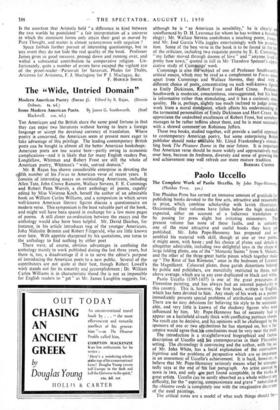The "Wide, Untried Domain"
THE Americans and the British share the same good fortune in that they can enjoy two literatures without having to learn a foreign language or accept the devalued currency of translation. Where poetry is concerned, the Americans seem at present more eager to take advantage of this privilege. The leading contemporary British poets can be bought in almost all the better American bookshops: American poets are too scarce here—partly owing to economic complications—and it is likely that for many English readers Poe, Longfellow, Whitman and Robert Frost are still the whole of American poetry, Whitman's " wide, untried domain." Mr. B. Rajan has shown considerable enterprise in devoting the Eitfth number of his Focus to American verse of recent years. It consists of interesting essays on outstanding Americans, including Allen Tate, John Crowe Ransom, Wallace Stevens, E. E. Cummings and Robert Penn Warren, a short anthology of poems, capably edited by Miss Vivienne Koch, herself the author of an admirable book on William Carlos Williams, and a symposium in which seven well-known American literary figures discuss a questionnaire on modem verse. This symposium is the least valuable part of the book, and might well have been spared in exchange for a few more pages of poems. A still closer co-ordination between the essays and the anthology would also have been helpful. Mr. David Daiches, for instance, in his article introduces two of the younger Americans, John Malcolm Brinnin and Robert Fitzgerald, who are little known over here. With appetite sharpened by his quotations, one turns to the anthology to find nothing by either poet There were, of course, obvious advantages in confining the anthology mainly to work published during the last three years, but there is, too, a disadvantage if it is to serve the editor's purpose of introducing the American poets to a new public. Several of the contributors are not quite at their best, though Robert Lowell's work stands out for its sincerity and accomplishment ; Dr. William Carlos Williams is in -characteristic 'Mood (he is not as impossible for English readers to " get " as Mr. James Laughlin suggests, for, uninfluenced by D. H. Lawrence for whom he has written a beautif elegy) ; Mr. Wallace Stevens contributes a touching poem, Imago, and Mr. Jose Garcia Villa juggles entertainingly with his punctua tion. Some of the best verse in the book is to be found in the test of the criticism, including two exquisite poems by E. E. Cumming,, " my father moved through dooms of love " and " anyone lived in pretty how town," quoted in full in Mr..Theodore Spencer's appre. ciative study of Cu s' work.
Cummings is, also thiftubject of one of Professor Southworth's critical essays, which may be read as a complement to Focus since, apart from Cummings and Wallace Stevens, they deal with a different choice of poets .concentrating on such well-known figures as Emily Dickinson, !Ebben Frost and Hart Crane. Professor Southworth is moderate, conscientious, unexaggerated, but his book is informative rather than stimulating, and it has a curiously static quality. He is, perhaps, slightly too much inclined to judge artistic work from a moral standpoint, which affects his understanding of the tormented personalities of Emily Dickinson and Hart Crane. He appreciates the undoubted excellences of Robert Frost, but somehow manages to be rather tedious about them, and he is most successful with a shrewd commenton Robinson Jeffers.
These two books, studied together, will provide a useful approach to contemporary Americv poetry, but some enterprising British publisher should make illrilable Mr. Lloyd Frankenberg's stimula• ting book The Pleasure Dome in the near -future. It is important that American verse should be more widely and appreciatively read over here, because its freshness, diversity and sense of growing life and achievement may well refresh our more mature tradition.
BARBARA COOPER.


































 Previous page
Previous page